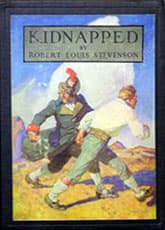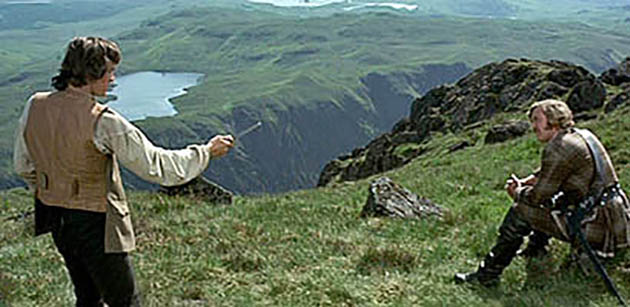Kidnapped
Critique • Quotes • At the movies
 1913 edition
1913 editionFirst publication
1886 in Young Folks magazine
First book publication
1886, England
Literature form
Novel
Genres
Literary, historical fiction, adventure, youth
Writing language
English
Author's country
England
Length
Approx. 88,000 words

David Balfour (Lawrence Douglas) confronts Adam Breck (Michael Caine) in 1971's Kidnapped .
Bogged down in Scotland
Kidnapped (1971): Film, 107 minutes; director Delbert Mann; writer Jack Pulman; featuring Michael Caine, Lawrence Douglas, Donald Pleasance, Trevor Howard
One thing the 1971 Kidnapped has going for it is that it was actually filmed in Scotland. One can see what the rascal Alan Breck rhapsodizes about: the ruggedly gorgeous Highlands of heather-covered hills and serene lakes, filmed in rich green and brown hues.
Also it has young Michael Caine, who cuts a romantic figure as Breck, with dashing mustache and long blond hair. Caine makes for a complex rebel, by turns rambunctious and peaceful, hard-hearted and loving, inspiring and jaded. But the transitions are never jarring. Caine's unpretentious acting style keeps him from turning the mercurial character into a cartoon. A very human man behind the legend.
Unfortunately, he's paired with a poor David Balfour. It's not Lawrence Douglas's fault he was cast for the role. Davie's supposed to be fifteen (this is said in the movie), but Douglas looks more like twenty-five. A cute twenty-five, granted, but cute in the way of a mid-1960s pop star—always with his shaggy hair beautifully coiffed, no matter what hardships he and Alan go through in their fights and flights. Hard to feel sympathy for the poor little orphan boy shanghaied to sea and hunted across the highlands.
Nonetheless, the first half of the film is ripping good. In a departure from the book, the film starts in the aftermath of the Battle of Culloden, in which thousands of Jacobite rebels were killed by the British forces and their cause decisively defeated. Against this background Davie is sold by his uncle to a sea captain, fights alongside Breck against their common captors, is shipwrecked, and is thrown in with the remnants of the Scottish rebels. Lots of action and intrigue, not so much between the Brits and Scots as among the Scottish factions themselves.
It all bogs down in the second half, though, after Davie and friends make their way to Edinburgh. Now the political story thickens. All about the differences between the Lowlander and Highlanders (Balfour and the Edinburgh authorities versus Breck and his friends), between the clans (the fighting Stuarts and the compromising Campbells), and between the rebels who want to fight on and the rebels who concede defeat (Breck versus just about everyone else). Veteran British actors Gordon Jackson as a rebel lawyer and Trevor Howard as the lackey Lord Advocate come to dominate the screen in a lot of talkative scenes.
Much of this material comes from Catriona, Robert Louis Stevenson's sequel to Kidnapped. Scuttlebutt has it that this is because the production ran out of money and could no longer afford to shoot any more of the exciting Kidnapped plot. Hence, that part of the story is condensed and more talky scenes are added.
Still, enough of Stevenson's tale does get through and, led by Caine, the team delivers a sincere and thoughtful version of the great work.
— Eric

